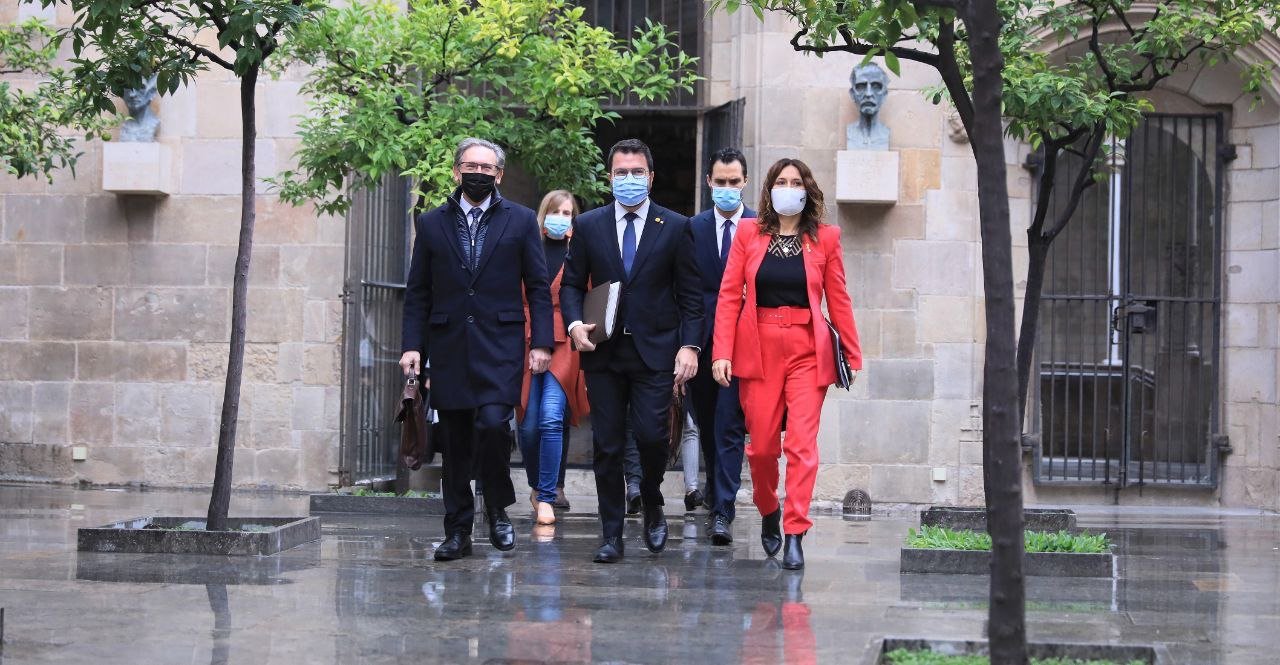Catalonia's High Court of Justice (TSJC) has refused to investigate Catalan president Pere Aragonès and two of his ministers, Jaume Giró and Laura Vilagrà, over the bail guarantees provided by the Catalan Institute of Finance (ICF) to the former senior government officials indicted by the Court of Accounts. In a ruling this Thursday, the court agreed with the view expressed by the public prosecutors and rejected the admission of complaints filed by two political parties, Vox and Ciudadanos, along with the pressure group Convivència Cívica Catalana, against the three politicians for the crimes of abuse of authority and misuse of public funds.
Without backing from the prosecutor, all the signs were that the complaints would not be accepted. The Public Prosecutor's Office stated in its report that "the mere articulation of a guarantee mechanism which, provisionally, guarantees the interim requirements of a judicial or administrative procedure involving a civil servant or authority, does not in itself imply that it causes damage to public assets nor, thus, any crime of misuse of public funds". Vox issued complaints against president Pere Aragonès, economy minister Jaume Giró and presidency minister Laura Vilagrà for the crimes of abuse of administrative authority and misuse of public funds. Convivència Cívica Catalana denounced only Pere Aragonès for the same offences. Carlos Carrizosa, of Ciudadanos, made his complaint against the entire Catalan government cabinet alleging misuse of public funds.
The judges, in line with the public prosecutors' arguments, consider that the government of the Generalitat "still retains control over the funds and has an executive procedure that guarantees their return. Members of the government could only be prosecuted if the guarantee was executed and then no return was requested."
The possible crime of abuse of administrative authority was also ruled out, according to the court, because the Catalan government is not only an administrative body but a political and constitutional one, and its political and legislative acts, such as the decree law on the bail guarantees passed in July, cannot be prosecuted for prevarication, because they are not simple administrative resolutions, but rules with the force of law. In fact, it notes that the decree law was created to urgently resolve the Court of Accounts' request to several former senior government officials for endorsements, but it also covers other possible cases affected by similar circumstances who do not yet have a final court sentence.
According to the court, these guarantees have certain conditions, such as the fact that it only applies when the actions pursued by justice are committed in the exercise of public office, are not covered by insurance or when the Catalan government itself is not pursuing them. As well, all amounts must be returned to the treasury when the final court sentence arrives, if that ruling finds the accused guilty of the offences.
The TSJC notes that the case is also being appealed to the Constitutional Court by Vox.
5.4 million euros demanded by tribunal
On June 29th this year, over 30 former Catalan government officials were ordered by the Court of Accounts, Spain's public auditing tribunal, to immediately hand over a total of 5.4 million euros, a sum which it alleges was improperly spent between 2011 and 2017 by the Catalan government's foreign affairs area on promotion of Catalan independence. In July, the Catalan government passed a decree-law creating a risk fund to cover the sums until a final court sentence on the matter arrives, and this prompted the complaints against the Aragonès executive.
Meanwhile, the case moves forward in the Court of Accounts. Despite the fact that the controversial auditing institution has in the last few weeks had its membership almost completely renewed, outgoing Court of Accounts delegate Margarita Mariscal de Gante this week completed the processing of both this case and another, in relation to Catalan government spending on the 2017 independence referendum, which will now move from investigation to trial phase.

